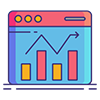SEO Score

What Is an SEO Score?
Search engine optimization (SEO) score is a measure of how well optimized for search engines your website is. Your website’s SEO score will play a big part in your search engine ranking.
The better your SEO score, the higher your chances of ranking at the top of the search results, which means more visibility online, more traffic, and possibly more customers.
In this article, we’ll look at what determines your SEO score so you can improve it if needed. Read on to find out more.
What Determines Your SEO Score?
Your SEO score is the result of multiple factors that are under your control. You can optimize these to improve your score. Let’s take a closer look at the key areas that contribute to the SEO score of a website.
1. Technical Features and Optimizations
 Technical SEO is an important component of a website’s SEO score. It aims to make your website easy to access and index by search engine crawlers as well as to send the right security and performance signals to search engines.
Technical SEO is an important component of a website’s SEO score. It aims to make your website easy to access and index by search engine crawlers as well as to send the right security and performance signals to search engines.
Technical SEO includes using an SSL certificate to secure connections to your website, avoiding duplicate pages, using user-friendly URLs, improving server response times, ensuring your website runs smoothly, and generating XML sitemaps for search engines.
2. Website Content
 Content includes text as well as media such as photos, graphics, and videos. It also includes tags and meta descriptions that explain a page to both users and search engines.
Content includes text as well as media such as photos, graphics, and videos. It also includes tags and meta descriptions that explain a page to both users and search engines.
A major component of your website’s SEO score, website content should be unique, easy to read, and free from broken links. Most of all, it should provide value and be accessible across devices.
Website content includes keyword optimization, but it’s important to avoid overusing keywords. A keyword density of 1-2% for primary keywords usually contributes to a better SEO ranking.
Other good practices include linking to authoritative, non-competitor websites, using images in your content, adding Alt tags to make it easier for search engines to understand images, and properly formatting your content with subheaders, bullet points, and numbered lists where applicable.
3. Web Page Experience
 The overall web page experience your website provides is also important. A good website theme that provides easy navigation contributes to a better score. All your web pages should be within three clicks at most from your homepage.
The overall web page experience your website provides is also important. A good website theme that provides easy navigation contributes to a better score. All your web pages should be within three clicks at most from your homepage.
Visuals also contribute to the web page experience, as does the page load speed and how well structured the information that you are providing is.
4. Mobile-Friendly Design
 In a world where most Google searches are carried out on mobile, ensuring that your website displays well and runs smoothly on mobile devices will increase your SEO score.
In a world where most Google searches are carried out on mobile, ensuring that your website displays well and runs smoothly on mobile devices will increase your SEO score.
You want to use a responsive theme that adapts to the device it’s viewed on and ensure your content is easy to read on mobile through proper formatting and image size optimization.
How Can You Check Your SEO Score?
Google evaluates your web page SEO score when determining search results for keywords related to your web page. Knowing your SEO score can help you identify problems and fix them to rank better in the search results and stay at the top.
Today, there are many tools, both free and paid, that can assess your website or a particular web page and provide an SEO score. Free tools range from WordPress plugins like RankMath to Neil Patel’s SEO Analyzer. For best results, you want to optimize every page.
Content Planning – Better Score, Better Ranking
Checking your website’s SEO score regularly is a good practice that can help you prioritize your SEO efforts. It will enable you to find issues that could impact your SEO.
For example, you may have great content but a poor theme that doesn’t work well on mobile. At the end of the day, your website’s SEO score is a reliable measure of your site’s ability to send the right signals to search engines and attract traffic.